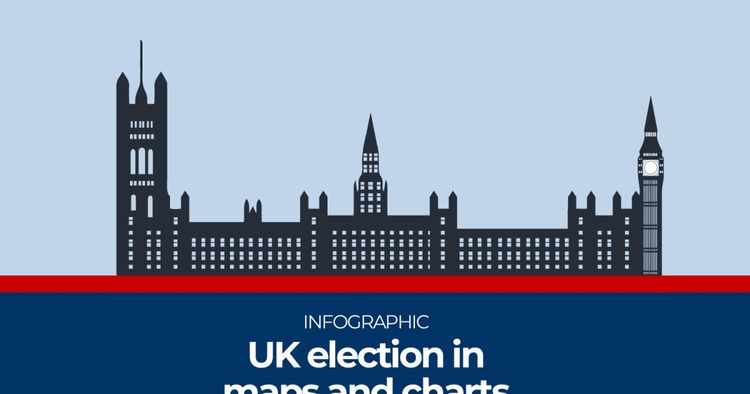UK general election 2024 explained in maps and charts

UK citizens will go to vote on July 4. Here's the important information about the political parties, leaders, and main election topics.
On July 4th, people in Britain will go to vote for the next political party to run the country, following Prime Minister Rishi Sunak's sudden decision to hold elections on May 22nd.
According to the polls, it looks like the Labour Party will win the election after the Conservatives have been in power for 14 years.
Here is a breakdown of important information regarding the imminent UK general election.
The UK, made up of England, Northern Ireland, Scotland, and Wales, is home to around 67 million people and has the sixth largest economy globally.
What Time Do Polls Open?
Voting locations all over the UK will be accessible on July 4th from 7 in the morning until 10 at night, according to local time (from 6:00 GMT to 21:00 GMT).
When Are The Results Coming Out?
On Thursday night around 10pm, exit polls will show us a quick look at how voters are feeling. A few results will be announced before midnight, but most constituency results won't come in until early Friday morning.
In 2019, the Conservatives' victory was officially announced around 5am.
How Voting Works In The UK
People in 650 areas in the UK will vote for representatives in the House of Commons using a system where the candidate with the most votes wins. Candidates have to get more votes than everyone else to secure a seat in Parliament.
A political party must win at least half of the seats - 326 in total - in order to have a majority in the House of Commons and be invited by the monarch, King Charles III, to create a government. The members of the House of Lords, the upper house of Parliament, are chosen rather than voted in.
When no single party secures enough seats to form a majority government, it results in a hung parliament.
UK Government Structure: A Brief Overview
In the UK, there is a constitutional monarchy where King Charles III is the head of state. However, the monarch's duties are mostly symbolic and ceremonial, such as giving approval to bills.
The government has a Parliament with two parts: the House of Commons and the House of Lords. They meet at the Palace of Westminster.
The leader of the executive branch of the government, who carries out laws, is the prime minister. The prime minister serves a five-year term and is in charge of selecting members of the Cabinet – top ministers who typically oversee government departments.
In the UK, there are separate governing bodies like the Scottish and Welsh Parliaments, as well as the Northern Irish Assembly. These groups have some authority to make laws.
The Parliament House has 650 seats, with each one representing a different area in the United Kingdom.
Prior to Parliament adjourning on May 30th, the House of Commons was comprised of representatives from 13 political parties and 17 independent members.
The rest of the seats, totaling 43, were divided among nine different political parties and independent candidates.
Party Performance In Past Elections
The Conservative party has controlled the government for 14 years, selecting five different leaders as prime minister.
In the last election in 2019, the Conservative Party, headed by Boris Johnson, received 43% of the total votes and won 365 seats. However, they have lost some seats since then, including during by-elections, and currently have 344 seats (before the dissolution on May 30 in preparation for the election). The Labour Party, led by Jeremy Corbyn, won 32% of the vote in 2019 and secured 202 seats. This number has now increased to 205 seats.
Gordon Brown was the leader of the UK government from 2007 to 2010, during the time of the last Labour administration.
What Are The Main Leaders And Parties?
In the United Kingdom, there are many different political parties, but the ones that have been the most influential in the 20th and 21st centuries are the Conservative Party and the Labour Party.
Top Concerns For The 2024 Election
The survey conducted by polling company YouGov found that the top concerns for Britons leading up to the elections are the economy, healthcare, immigration, housing crisis, and the environment.
The findings of the survey, as of June 24, are as listed:













































